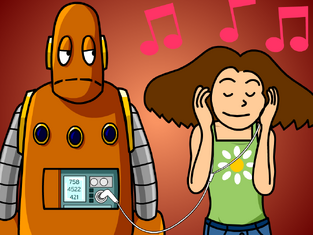| MP3 | |||
|---|---|---|---|
 | |||
| Season | 5 | ||
| Airdate | August 7, 2007 | ||
| Curriculum | Engineering & Tech | ||
MP3 launched in BrainPOP Engineering & Tech on August 7, 2007.
Summary[]
Tim discusses about the MP3 player with Moby after answering a letter.
Appearances[]
Transcript & Quiz[]
Quotes[]
- Tim: [carries a boombox]
FYI's[]

Real Life
In May 2000, some fans of the heavy metal band Metallica met up with an unpleasant surprise. The band discovered that fans had been using an online file sharing service called Napster to trade MP3s of their work. Instead of buying copies of new Metallica records, people would just download them for free from other Napster users.
So drummer Lars Ulrich and guitarist James Hetfield took two dramatic actions. First, they sued Napster in federal court for copyright infringement. Napster claimed it wasn’t responsible for the actions of people who used it, but Metallica argued that by allowing users to freely trade MP3s, the company was encouraging piracy. “This is about piracy—a/k/a taking something that doesn't belong to you; and that is morally and legally wrong,” Ulrich claimed in a press release.
Next, the band presented Napster with a list of more than 300,000 clients who’d been trading Metallica MP3s and demanded that the company suspend those accounts. Rap mogul Dr. Dre joined Metallica’s lawsuit, and Ulrich wound up testifying about the issue in front of the U.S. Senate Judiciary Committee.
A federal judge ruled that Napster had to either prevent users from trading MP3s illegally or shut down. However, the two sides eventually reached an agreement when Napster was bought out by a large German corporation. For their efforts, Metallica received praise from fellow artists, but were widely jeered by music fans.

Gadgets
You probably don’t remember what you were doing on October 23, 2001. But that date marked the key turning point in the digital music revolution. Why? Because that was the day that Apple Computer unveiled its brand-new iPod digital media player.
Digital devices like cameras and personal organizers had become hot consumer products during the late 1990s and early 2000s. But digital music players were clunky and difficult for non-techies to operate. So, when Apple CEO Steve Jobs introduced his company’s sleek new user-friendly device—which he bragged could “put 1,000 songs in your pocket,” music fans around the world rushed out to buy them.
Although they had less memory than today’s iPods (just 5 gigabytes), and cost nearly $400, Apple sold 125,000 of them in just two months. Even after Microsoft and other companies introduced their own digital media players, the iPod continued to dominate sales. As of 2008, more than 70 percent of all players sold were iPods. The devices routinely account for between 25 and 45 percent of Apple’s total sales each fiscal quarter, and in March 2008, Apple announced that they’d sold 150 million of them.
Schools, businesses, and governments began using compressed sound files including MP3s on iPods to train new staff members, teach lessons, and transmit other forms of information. In fact, beginning in 2004, Duke University began supplying free iPods to all of its incoming freshmen!
Image: A first-generation iPod

Did You Know?
As you probably know, MP3 isn’t the only digital music format. Here’s a look at some others:
Audio Interchange File Format (AIFF): Developed by Apple Computers in 1988, AIFF is still used on Macintosh computers. AIFF files are uncompressed, which makes them much larger than MP3s. But they also have higher-quality sound, which makes AIFF files perfect for burning onto music CDs.
Waveform Audio File (WAV or Wave): Developed in 1991 by Microsoft and IBM, WAV files are “lossless” files—that is, even though the data on the file is compressed, the audio quality is not compromised one bit. However, WAV files tend to be very large, which makes it ideal for storing short sound effects, but not so good for storing a lot of music.
Advanced Audio Coding (AAC): AAC files are compressed at the same rate as MP3s, and thus take up the same amount of disk space. However, they offer much better sound quality.
Vorbis: Back in the late 1990s, some folks were worried that software companies would start charging users for every MP3 they owned. So, a nonprofit foundation created a free alternative called Vorbis, named after a character in a series of fantasy novels by Terry Pratchett. Although companies never began charging for MP3s, rendering the format somewhat useless, it’s still used to hold audio content in video games.

In Depth
During the first decade of the 21st century, the music industry was shaken by a devastating trend toward lower sales—and MP3s were largely to blame.
In the year 2000, consumers bought 785.1 million albums; in 2006, they bought 588.2 million. While the top 10 albums in 2000 sold a total of 60 million copies, the top 10 albums in 2006 sold only 25 million—a decline of almost 60 percent. Before 2000, it wasn’t uncommon for a best-selling album to move 500,000 copies in a week. In 2007, however, chart-topping albums would routinely sell between 60-65,000 copies.
During that time, more than 5,000 record company employees lost their jobs, and several thousand record stores across America closed. These included major chains like Tower Records and Sam Goody. By 2007, 65 percent of record sales took place in locations that weren’t record stores, like Wal-Mart and Costco. During the 1990s, these stores had accounted for just 20 percent of record sales.
One of the biggest reasons for this trend was the rise of MP3s—specifically, the illegal downloading of MP3s. Although sales of legally downloaded songs and ringtones skyrocketed during this period, the money they made for the record companies was not enough to offset the huge decline in sales. Meanwhile, one study estimated that in early 2007, more than 1 billion songs were being illegally traded online every single month. Pretty amazing!
FYI Comic[]

